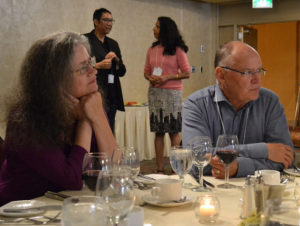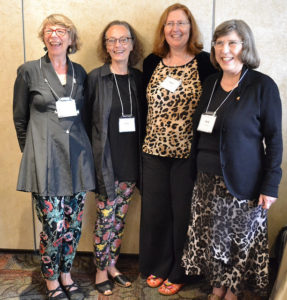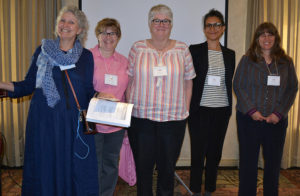The Indexing Society of Canada / Société canadienne d’indexation (ISC/SCI) is Canada’s national association of indexers.
We invite you to find an indexer for your project, read our publications, discover our conferences, events, and resources for indexers, find out about membership, and learn about the Society.
Find an indexer
Find an indexer who works in the subject area of your project.
Find resources
Find information about indexes, indexing practices, and training in indexing.
Attend an event
Attend a local meeting of indexers or attend the annual conference.
Become a member
Join the Society and enjoy the benefits of membership.
Featured Post
What practices will help me with good index term selection?
2018 Tamarack Award: Christopher Blackburn
Indexing Society of Canada
The Tamarack award was instituted to recognize members who go “above and beyond the call of duty” in their volunteer work for the Society.
This year we have chosen Christopher Blackburn as the Tamarack Award recipient for that very reason.
The award is a symbol of our thanks and gratitude for what he has given to the Indexing Society of Canada |Société canadienne d’indexation and is well-deserved after many, many years of service for our Society.
Chris served as a dedicated Central Canada regional representative and has been a member of the Executive committee where he provided wise and thoughtful contributions.
You could consider Chris our Society historian! He has in his possession every issue of the Bulletin since its inception, attended numerous conferences, both national and international, notably England, Ireland, and the US. He has made several contributions to the Bulletin reporting on the many events he attended. His involvement can be traced back to 2001, planning the Toronto conference when our Society was called the Indexing and Abstracting Society of Canada (IASC/SCAD). Chris has a deep and personal knowledge of the evolution of indexing methods and is always willing to share his indexing knowledge with other members.
Chris was presented with the Tamarack Award and he humbly accepted it at our recent Toronto indexers’ meeting in June. It was a delightful moment!
We are honoured to present this award to Chris this year and we are honoured to have him as a member of our Society.
Thank you and congratulations, Chris!
Margaret de Boer
Senior Co-President
Alexandra Peace
Junior Co-President
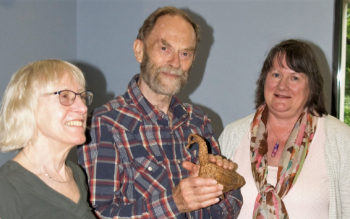
A big thank you to our conference donors and sponsors
Indexing Society of Canada
 Thanks to the wonderful donors and sponsors of our 2018 Conference in Winnipeg!
Thanks to the wonderful donors and sponsors of our 2018 Conference in Winnipeg!
Their contributions of door prizes and equipment helped make the conference a success.
- Carol Saller Fisher and the University of Chicago Press
- Frances Curry
- Mary Newberry
- Friesens
- McNally Robinson Booksellers
- Fernwood Publishing
- Nan Badgett
- Frances Lennie at Indexing Research
- Gregory Younging
- Wolseley Wool
- Canadian Museum for Human Rights
- Unifor Local #4209
- Fort Garry Hotel
2018 Ewart-Daveluy Award: Audrey McClellan
Indexing Society of Canada
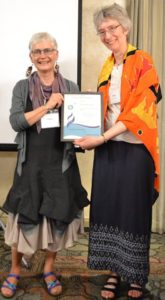
Audrey McClellan was presented with the Ewart-Daveluy Award for Indexing Excellence at the awards banquet of the Indexing Society of Canada in Winnipeg on June 9, 2018, for her index to Barry Gough’s Churchill and Fisher: Titans at the Admiralty, published by Seaforth Publishing.
As its title suggests, the book focuses on the relationship between Winston Churchill, as First Lord of the Admiralty, and John Fisher, as First Sea Lord of the British Royal Navy, but also covers the evolution of the British Navy during the late 19th and early 20th centuries and the relevant events of the First World War.
The indexing challenge was to compress 585 pages of what often felt like three books in one into a 13-page index accompanied by a short Index of Ships. Audrey rose to this challenge, achieving a thorough and comprehensive coverage of all relevant topics and personal names, along with the interrelationships between and among topics and names within the space constraints.
An excerpt from the index is available here, courtesy of Seaforth Publishing.
Another Successful Conference
Indexing Society of Canada
2018 Conference Photos Here!
Indexing Society of Canada
This content is reserved for members. To continue reading, please log in or become a member today.
Ce contenu est réservé aux membres. Pour continuer à lire, veuillez-vous connecter ou devenez membre dès aujourd’hui.

